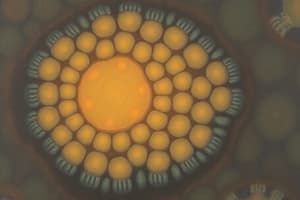Podcast
Questions and Answers
The cell membrane is also known as the blank membrane.
The cell membrane is also known as the blank membrane.
False (B)
Prokaryotic cells are found in blank and archaea.
Prokaryotic cells are found in blank and archaea.
False (B)
Eukaryotic cells are found in blank, animals, fungi, and protists.
Eukaryotic cells are found in blank, animals, fungi, and protists.
False (B)
The cell membrane is composed of a blank bilayer with embedded proteins.
The cell membrane is composed of a blank bilayer with embedded proteins.
The cytoplasm is the jelly-like substance within the blank.
The cytoplasm is the jelly-like substance within the blank.
The cytoplasm is divided into two regions: the nucleoplasm, which surrounds the nucleus, and the cytoplasm, which is located in the rest of the cell.
The cytoplasm is divided into two regions: the nucleoplasm, which surrounds the nucleus, and the cytoplasm, which is located in the rest of the cell.
The nucleus is surrounded by a single membrane.
The nucleus is surrounded by a single membrane.
Cell division involves the process of mitosis and meiosis.
Cell division involves the process of mitosis and meiosis.
Apoptosis is a more chaotic and damaging form of cell death.
Apoptosis is a more chaotic and damaging form of cell death.
Cell growth refers to the decrease in cell size and mass.
Cell growth refers to the decrease in cell size and mass.
Flashcards are hidden until you start studying
Study Notes
Introduction
Cell biology is a branch of biology that studies the structure, function, and behavior of cells, the fundamental unit of life. It covers various aspects of cellular processes, including cell division, growth, and death, as well as the organization and regulation of cellular components. In this article, we will explore the fascinating world of cell biology, delving into the structure, function, and behavior of cells, and discussing the various processes and components involved in the life of a cell.
Cell Structure and Components
Cells are the basic building blocks of all living organisms, and they come in a variety of shapes and sizes. The three main types of cells are prokaryotic (found in bacteria and archaea), eukaryotic (found in plants, animals, fungi, and protists), and archaeal cells.
Cell Membrane
The cell membrane, also known as the plasma membrane, is a selectively permeable barrier that separates the cell's interior from the external environment. It is composed of a phospholipid bilayer, with proteins embedded in it, and plays a crucial role in maintaining the cell's integrity and regulating the movement of substances in and out of the cell.
Cytoplasm
The cytoplasm is the jelly-like substance within the cell membrane, and it contains various organelles and molecules that carry out the cell's functions. The cytoplasm is divided into two regions: the nucleoplasm, which surrounds the nucleus, and the cytoplasm, which is located in the rest of the cell.
Nucleus
The nucleus is a highly specialized organelle that contains the cell's genetic material, or DNA. It is surrounded by a double membrane and is the site of several important cellular processes, such as transcription (the process by which DNA is converted into RNA) and mitosis (cell division).
Cellular Processes
Cells carry out a wide range of processes to maintain their structure, function, and survival. Some of the most important cellular processes include:
Cell Division
Cell division is the process by which a single cell divides into two identical daughter cells, allowing for growth and repair. There are two main types of cell division: mitosis, which occurs in somatic cells (cells that make up the body), and meiosis, which occurs in germ cells (sperm and egg cells).
Cell Growth and Metabolism
Cell growth refers to the increase in cell size and mass, while metabolism is the set of biochemical processes that occur within the cell. These processes involve the breakdown of nutrients, such as sugars and fats, to produce energy and the synthesis of new cellular components, such as proteins and nucleic acids.
Cell Death
Cell death, or programmed cell death, is a natural process by which cells are eliminated from the body. There are two main types of cell death: apoptosis, which is a controlled, orderly process, and necrosis, which is a more chaotic and damaging form of cell death.
Conclusion
Cell biology is a fascinating and complex field that provides a deeper understanding of the fundamental unit of life: the cell. By studying the structure, function, and behavior of cells, we can gain insights into the processes that sustain life and the mechanisms that drive growth, development, and disease. As our knowledge of cell biology continues to expand, we can expect to uncover new and exciting discoveries that will shape our understanding of the biological world.
Studying That Suits You
Use AI to generate personalized quizzes and flashcards to suit your learning preferences.



